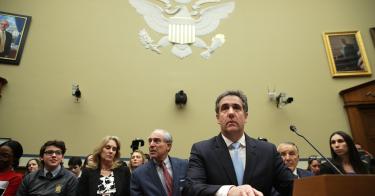Michael Cohen came prepared to play the part the far-left needed him to play, and his hearing before the House Oversight and Reform Committee quickly devolved into a professional wrestling atmosphere.
As soon as Cohen stepped into the ring, tempers flared, and accusations regarding the private affairs of then-private citizen Donald Trump flew. As with professional wrestling, everyone knows the outcome is predetermined, but tunes in for the body slams anyway.
Cohen quickly hit on themes and took shots that would fire up the media and far-left base: Trump’s a liar. He’s vain. He once engaged in shenanigans at a charity auction. He’s worried about his SAT scores. He paid off a sexual allegation extortion scheme with private money.
Even that wasn’t enough. Cohen, a former leader of the National Diversity Coalition for Trump, even called the president a racist.
This gratuitous spectacle took place while the president was on foreign soil negotiating matters of denuclearizing the Korean Peninsula, a critical national security and foreign policy issue. This appears to risk sabotage of the imperative negotiations for the purpose of scoring cheap political points to deny the president any chance of success, even on a foreign policy issue which could improve the safety and security of the nation and the world.
There’s a reason hearings like these are remarkable: They aren’t the business of Congress. In 1957, the Supreme Court dealt with the issue of a congressional investigation exceeding its bounds in U.S. v. Watkins, which, the New York Times then said, led to the Court “plac[ing] fundamental restrictions on a congressional investigatory power that in recent years has been asserted as all but limitless.”
The limits were based on the Congress’ oversight powers as being rooted in and limited by the need for obtaining such information only necessary to inform legislation. That necessarily means, “Congress has no general authority to expose the private affairs of individuals,” and, “No inquiry is an end in itself; it must be related to, and in furtherance of, a legitimate task of Congress.”
Yet with Cohen, we saw the committee ignore the Supreme Court and engage in the congressional equivalent of Wrestlemania. Much of the misconduct Cohen alleged cannot credibly form the basis of an impeachment resolution, so the show’s sole purpose seemed to be to embarrass the president. This lawless exercise of mudslinging is beneath the dignity of the House of Representatives and an insult to all those citizens who sent these legislators to Washington to do the important job of legislating. The hearing played more to the media than to the general public.
Much like a premiere championship match, the media needs heroes (the resistance) and villains (Donald Trump), simple story lines, and winners and losers. Any conflicting element is unwelcome, and thus any criticism of heroes will be ignored and buried. The media has consistently ignored the financial and campaign allegations, alleged anti-democratic behavior, and posturing about privacy coming from many of the president’s opponents on the committee, even as the president now stands accused of all three.
All in all, the hearing offered very little in terms of new facts and absolutely nothing that would be of benefit to the job of Congress: legislating. Cummings and others on the Left succeeded only in destroying the credibility of this congressional committee.
This low-water mark for congressional oversight should serve as a call to reform the system and refocus Congress on the job of legislating. Public trust in these spectacles is minimal. Congressional oversight is notoriously ineffective at fact-finding and even worse at changing minds. People are correct to doubt the conclusions of partisan operations. These made-for-TV events only reinforce the worst elements of our current political environment and increase polarization. In this instance, it may have impaired or distracted from the president’s ability to negotiate a denuclearization deal.
Our nation faces serious issues of national security, foreign policy, a broken immigration system, and an increasingly complex global economy, which will require significant buy-in from Congress. Serious lawmaking needs serious lawmakers. Judging from the committee's show, the demand for serious lawmakers far exceeds the supply.
Next time I’ll choose replays of old Hulk Hogan matches. They’re more believable, and the characters are more likable.
This piece originally appeared in The Washington Examiner




